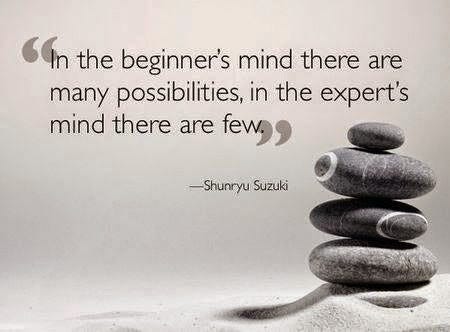Thirsty for a Strong Instructional Practice?

“In the beginner’s mind there are many possibilities, but in the expert’s there are few.” Shunryo Suzuki, Zen Mind Beginner’s Mind
Beginner’s mind: a Zen Buddhism term that refers to having an attitude of openness, eagerness, and lack of preconceptions when studying a subject.
Take a SIP of this: Beginner’s Mind
Diving off the deep end: For many, the older we become, the less likely we are to take risks, to jump into the deep end. Instead we tend to settle deeper into our comfort zones. As teachers this can lead to a cycle of the same routines, same lesson plans, some assignments semester after semester. Unmotivating for you and for your students. Be open to new possibilities by trying something different. Try a new lesson, technology or teaching strategy. Update your learning materials. Incorporate more cooperative learning. Search the The Well for SIP ideas. Be willing to take a risk.
An open state of inquiry: There is a danger that comes with expertise. We tend to be resistant to information that doesn’t conform to our long-held beliefs and schemas of the world around us and gravitate to information that confirms our current philosophy or previous experience. We tend to “cherry-pick information to justify our current behaviors and beliefs. Most people don’t want new information, they want validating information.” To move beyond the familiar, look at old or familiar concepts with a beginner’s mind or better yet, become a beginner. Challenge yourself to learn a new skill. Immerse yourself in the beginner’s mindset and let that mindset influence your teaching.
Bursting bubbles: We live in bubbles. We tend to surround ourselves with others who share our beliefs, opinions, likes and dislikes. We engage in activities and participate in events that reinforce our bubbles. How you choose to structure your life determines what kind of experiences you will encounter. Over time this creates a loop, a cycle of normality. How often do you step out of your bubble? How often do you experience discomfort due to unfamiliarity? How often do you encourage your students to step out of their bubbles? The more time you spend with individuals who are different than you (whether that be religion, race, sexuality, lifestyle, etc.) the greater the perception of common interests, common humanity and most importantly, compassion. As teachers we have the opportunity to model acceptance and compassion in our classrooms.
Be passionate: Passion is contagious. You aren’t likely to ignite the excitement of learning in your students if you aren’t excited yourself. Take time to share what makes you passionate. Equally It is important to let students pursue their own passions, especially in the absence of feedback or judgment
Still Thirsty? Take another SIP Food Insecurity and Poverty in the College Classroom
Check out a few the many resources available to help us burst familiarity bubbles and cultivate a beginner’s mind — in our students, and in ourselves. * Six Steps to Cultivate a Beginner’s Mind: https://www.unstuck.com/advice/6-tips-cultivate-beginners-mind/
- The Secret to Great Teaching: Maintain a Beginner’s Mindset: https://www.teachingchannel.org/blog/2014/04/18/maintain-a-beginner-mindset
- Embracing the Beginner’s Mind: https://kripalu.org/resources/embracing-beginner-s-mind
- Three Ways the Beginner’s Mind Improves Practice: https://www.semperviva.com/3-awesome-qualities-of-having-a-beginners-mind/
- The Zen Teacher: https://www.thezenteacher.com/blog/category/beginners-mind
- The Un-tv and the 10 Mph Car: Experiments in Personal Freedom and Everyday Life https://books.google.com/books?id=nLQAAAAACAAJ&source=gbs_navlinks_s
- This Book Is Not Required: An Emotional and Intellectual Survival Manual for Students https://us.sagepub.com/en-us/nam/this-book-is-not-required/book237178
- Tools for Bursting Your Filter Bubble: https://medium.com/@nicklum/tools-for-bursting-your-filter-bubble-51f482027128
- Beware of Online Filter Bubbles: https://www.ted.com/talks/eli_pariser_beware_online_filter_bubbles
- Randomized Living: https://www.opencolleges.edu.au/informed/features/25-ways-to-institute-passion-based-learning-in-the-classroom/
Visit The Well at http://sites.msudenver.edu/sips/ for more great ideas and resources for Strong Instructional Practices in your higher education classroom!
